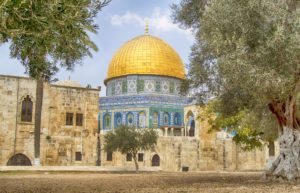
Share this Blog
Al-Isra’ wal-Mi’raj
Al-Isra’ wal-Mi’raj
Commentary
Described in this verse is the event of Mi’raj (the Ascent to the heavens, or al-‘lsra’, the midnight journey of the Holy Prophet which is a signal honor and distinctive miracle of our Messenger of Allah The word: أَسْرَىٰ (asra) is a derivation from: إسْرَىٰ (isra’) which literally means to make someone travel at night. After that, the introduction of the word: لَيْلًا (lailan) also makes this sense very clear. Then, by placing this word as a common noun, the indication released was that during this event the time spent was that of a part of the night – not even that of the whole night. The journey from al-Masjid al-Haram to al-Masjid al-Aqsa mentioned in this verse is called al-‘lsra and the name Of the journey from here to the seven heavens is al-Mi’raj. Isra’ stands proved under the definitive textual authority of this verse and the Mi’raj finds mention in the verses of Surah an-Najm and is proved by Ahadith appearing in an uninterrupted succession. The word: بِعَبْدِهِ (bi’abdihi: His servant) used here for the Holy Prophet is special. It shows that, in this magnificent setting of honor and welcome, when Allah Ta’ala, on His own, elects to call someone ‘His servant’, a unique bond of love lies embedded therein and that this is the highest honor any man could ever have.وَعِبَادُ ٱلرَّحْمَـٰنِ ٱلَّذِينَ يَمْشُونَ عَلَى ٱلْأَرْضِ هَوْنًا وَإِذَا خَاطَبَهُمُ ٱلْجَـٰهِلُونَ قَالُوا۟ سَلَـٰمًا
The ˹true˺ servants of the Most Compassionate are those who walk on the earth humbly, and when the foolish address them ˹improperly˺, they only respond with peace. [Surah Al-Furqan, Ayah 63]
From here, we also learn that the highest achievement man is capable of is to become a perfect servant of Allah – for, on this eve of special honor, the quality of ideal servitude, out of his many attributes of perfection, was chosen. Then, the presence of this expression yields yet another beneficial outcome in that no one gets the wrong impression of divinity from this wonderful journey by night which, from its beginning to the end, is full of extra-habitual miracles. This is something like what happened with the Christians who fell into deception over the event of Sayyidna ‘Isa (AS) being raised unto the heavens. For this reason, by saying (‘abd: servant), it was declared that, despite all those attributes, achievements and miracles, the Holy Prophet (ﷺ) was still a servant of Allah, not god.The Qur’an, Sunnah and Ijma’ prove that the Mi’raj was physical
It is proved from the text of the Holy Qur’an, and from Ahadith coming in uninterrupted succession mentioned later that the entire journey of the Isra’ and Mi’raj was not simply spiritual, instead, it was physical – like the journey of anyone else. The very first word of the Holy Qur’an in this Surah: سُبْحَـٰنَ (Subhan: Pure is He!) carries a hint in this direction because this word is used to register wonder or introduce a great marvel. Had the Mi’raj been merely spiritual, just a matter of dream, what was there so unusual about it? As for a dream, every Muslim, even every human being, can see it and report that he or she went to the heavens, did this and did that. The second indication embedded in the word عَبْد (‘abd: Servent) also points out in the same direction because ‘abd is no spirit all by itself, instead, it is the name of the combination of body and spirit. In addition to that, when the Holy Prophet related the event of Mi’raj to Sayyidah Umm Hani (RA), she advised him not to mention it before anyone otherwise people would falsify it even more. Had this been the matter of a dream, what was there in it that needed to be falsified?انْزِلْ فَصَلِّ
Dismount and pray
سُبْحَـٰنَ ٱلَّذِىٓ أَسْرَىٰ بِعَبْدِهِ
Exalted is He who took His Servant
YOUR WEEKLY DOSE OF
Share this Blog
Tuition Payment by Etransfer
Please send your etrasnfer in the full amount of your course tuition to
finances@ihsan.ca
IMPORTANT: The full name and email address you used to register for the course must be added as a note to the etrasnfer to assure the payment is applied to your account.